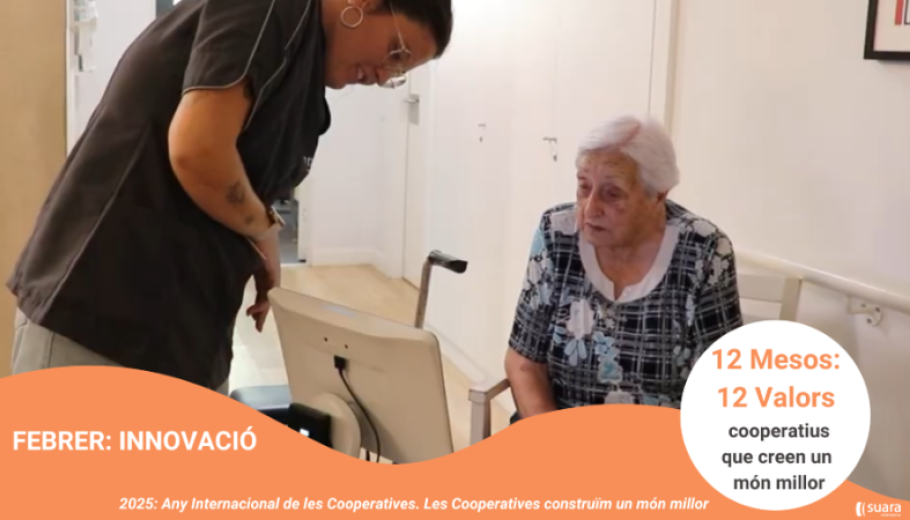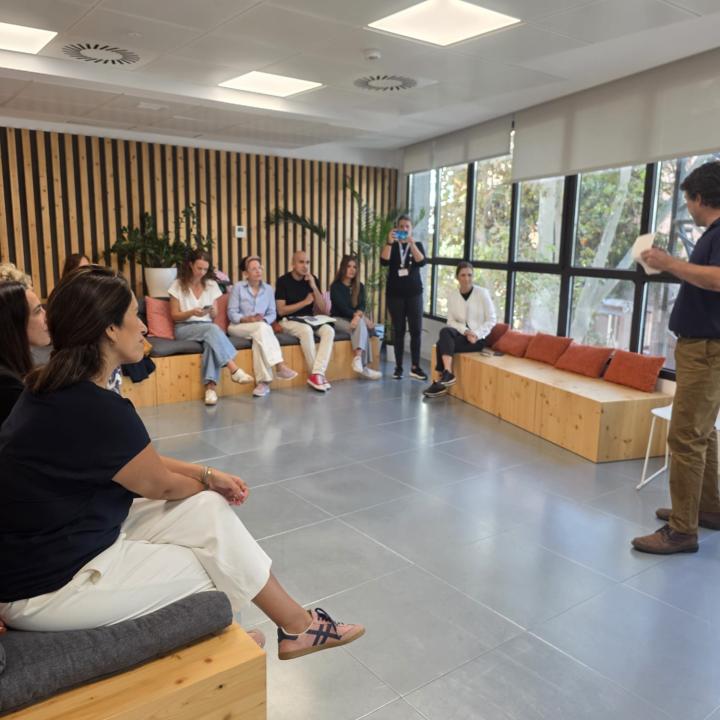On the occasion of the International Year of Cooperatives, this February we want to put on the table the importance of innovation reaching all households to break the existing digital, social and economic gaps.
More than half of households in vulnerable situations in Catalonia suffer from a digital deficit. This contributes to them losing job opportunities, training or even having access to socio-economic aid that they could receive, according to a study published by the Generalitat de Catalunya this 2023.
Therefore, on the occasion of the International Year of Cooperatives, this February we want to highlight the importance of all people having access to innovation and technology to break the existing digital, social and economic gaps.
In fact, along with social responsibility, participation and proximity, innovation is one of the key values of Suara Cooperativa, since from our organization we consider that, in a world that changes at a breakneck speed, we cannot leave anyone behind.
For this reason, at Suara, innovation is a transversal value in our services and, from the Social Digital Lab, our Social Innovation laboratory, we co-create with citizens, start-ups, universities and research institutes different innovative solutions to existing social challenges. This working methodology has led us to be a benchmark in disruptive technology, for which we have received the Catalonia Exponential Leader seal from ACCIÓ.
Currently, we are working with virtual and immersive reality to improve the health and emotional, mental and/or cognitive well-being of both workers and people being served. On the other hand, together with V-Tools, we have developed an experience with virtual reality that has helped us combat the scourge of gender violence among the adolescent and young population.
We also have several pilot tests underway for care robotics in homes and nursing homes; at the same time, we are implementing sensors, artificial intelligence, smart watches and voice assistants to improve home care.
Finally, we have 3D printers and training in this technology and programming so that Suara Cooperativa workers can implement this knowledge in their services.
In constant search for new innovative proposals
Also with this mission of implementing innovation in our services, we participate in scouting processes at fairs and congresses in the technology sector. This consists of presenting a challenge to find partners such as start-ups, universities or research institutes that help us make it a reality; as well as visiting different stands to learn about the latest developments and see if they can be implemented in our services.
That is why, from 4 to 7 February, we participated in the Integrated Systems Europe (ISE) fair, where we presented a challenge to the ACCIÓ Open Challenge to develop a Digital Twin technology that allows us to analyze a large number of data from Suara Cooperativa to recreate future scenarios that allow us to anticipate possible social problems or challenges. Initially, at Suara Cooperativa we want to implement it in the field of the aging population, but later, we also want to apply it to challenges that arise in other services of the cooperative where we serve people of all ages.
As part of this challenge, the team of the Social Digital Lab, the social innovation laboratory of Suara Cooperativa, met last week with ten companies in person and it plans to meet with seven more. “It has been very important for us to be here and to be able to have a table of care and future needs of aging within the framework of a Congress like this”, says Clara Garcia Blanch, head of Pilot Tests at Suara Cooperativa.
Also, next March we will go to the Mobile World Congress where we will participate in a talk organized by the Taula del Tercer Sector to present a pilot test, developed with Oroi, which has allowed us to bring virtual reality to various home care services and for the elderly. To make it a reality, we have trained different family workers, who are the ones who have been in charge of ensuring that people can use this technology that contributes to improving the emotional, physical and cognitive well-being of the people being cared for.
Innovation in the third sector
However, in the third sector, we still have the great challenge of being able to access innovation. To date, women still have little presence in professions linked to the world of innovation; while jobs in the social sector are eminently female. Therefore, as Bàrbara Outeiro, head of Open Innovation at Suara Cooperativa, pointed out in this article: we need more women engineers in the third sector.
However, for this to become a reality, stigmas must also be broken through education, play and leisure from early childhood. Joana Pegueroles, director of the Terres de l’Ebre Reception Centre (CATE), in a video on the occasion of 8-M, explained that the fact that girls play with dolls or kitchens and boys with cars or Lego ends up having an impact on their future. Women are in the majority in the care sector and men in science and technology.
“We have a key challenge: breaking with gender roles from education and play so that the girls of today and tomorrow enjoy the same job opportunities as men,” defends Pegueroles. This is precisely one of the objectives that is sought to be asserted on February 14, International Day of Women and Girls in Science, which emphasizes the importance of having leading women in STEAM professions (Science, Technology, Engineering, Arts and
Circular economy
At Suara Cooperativa we understand that the circular economy goes far beyond efficient waste management, but it is also about providing new job opportunities for workers to reinvent themselves. In this context, 67% of Suara's workers are women who work in professions such as family workers, gericulturas, administrators, workshop workers or workshop workers; and 15% are social educators, social workers, nurses or physiotherapists.
On the other hand, the majority of our innovation projects are led by women, who have decided to reorient their professional careers and who we have trained from our organization so that they can make this job change.¡
Will you help us bring innovation to the third sector? Break with gender roles from childhood so that today's girls can be the scientists, mathematicians or engineers of tomorrow.



